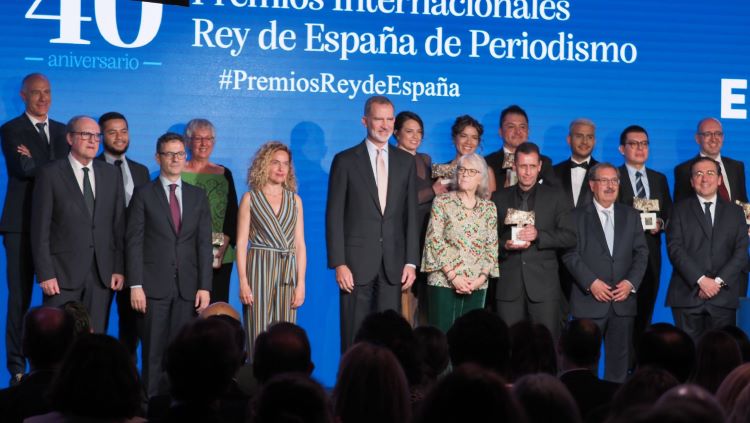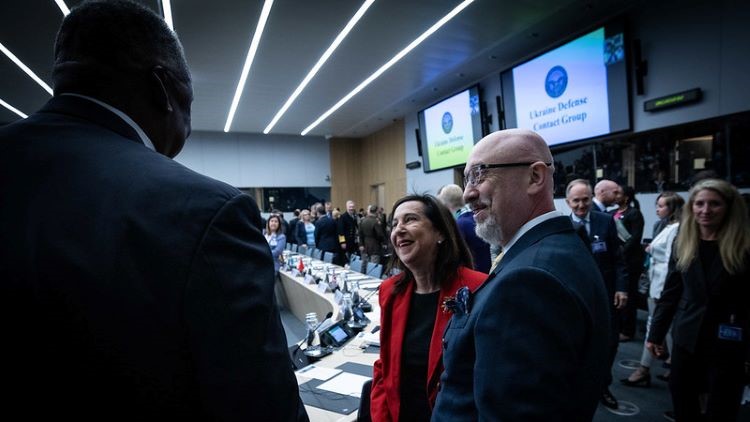The Diplomat
Felipe VI presented yesterday the King of Spain International Awards for Journalism 2023, the most prestigious in the Ibero-American field and which celebrate 40 years since their first edition. The event was attended by the Minister of Foreign Affairs, José Manuel Albares.
During his speech to the attendees, the King said that “the consolidation of these awards is proof, also, of the importance of journalism of excellence in today’s world, to know and know more and better what happens, what happens to us collectively and to make personal decisions and participate in the collective improvement of our societies and make them better”.
According to the Monarch, “in the age of information, disinformation is something that is of growing concern and has an excessive influence on debates, diagnoses, the understanding of facts and decision making”. Therefore, he warned, “independent journalism is essential, it is reflected every day and has been demonstrated in an extraordinary way after the succession of recent crises and their consequences, such as the pandemic or the war over Russia’s aggression and invasion of Ukraine!”, said Felipe VI.
“People’s interest in the news depends largely on the good practice of the journalistic profession, a fundamental challenge in these times of the rise of selective news evasion: connecting with people who have access to an unprecedented amount of online content, raising awareness among the youngest to avoid or reduce their fragmented access to news, which makes them lose, thus, the key context,” he continued. “Trust has been on a downward path for some time in some countries and more and better informed societies are needed,” because “the health of democracy and the hope for a better tomorrow depend on it,” he said.
For his part, Albares highlighted during his speech “the role of the journalistic profession in our societies at a particularly turbulent time in which access to truthful information, to research, to data, is undoubtedly a value that we must all protect, because it is a value that is seriously threatened”.
“The press is an absolutely fundamental pillar for building societies where democracies are strong, where citizens can freely debate and freely shape our own opinion”, because, he assured, “there can be no quality public debate, there can be no self-respecting democratic system” if it is not possible “to access a shared objective reality, and, therefore, addressing threats against freedom of information and expression is a key axis in our common work in Europe and Latin America”.
The award ceremony was held for another year in the Gabriela Mistral amphitheater of the Casa de América in Madrid and included a tribute to past winners, such as the Spanish-Peruvian Nobel Prize for Literature, Mario Vargas Llosa; Spanish writer Arturo Pérez Reverte, Spanish writer Carmen Posadas, Spanish writer Juan José Millás, Colombian writer Daniel Samper, Brazilian photographer Sebastián Salgado, Spanish journalist Gervasio Sánchez and former correspondent of Televisión Española in Colombia, Ana Cristina Navarro, current coordinator of the Pedagogy Strategy of the Truth Commission in that country. Among the attendees were also the Minister of the Presidency, Relations with the Courts and Democratic Memory, Felix Bolaños; the Ombudsman, Ángel Gabilondo; and the President of the Congress of Deputies, Meritxell Batet.
The awards, created by the EFE Agency and the Spanish Agency for International Development Cooperation (AECID), have been granted annually since 1983 to recognize the work of Spanish and Portuguese-language journalism professionals from the Ibero-American Community of Nations and the countries with which Spain maintains historical ties and cultural and cooperation relations. The awards also recognize work related to the environment and sustainability, culture and its capacity to promote citizen participation, innovation and social cohesion.
In addition to the prize money, the winners also receive a sculpture by the artist Joaquín Vaquero Turcios. The Awards have been presented since their inception by the now Emeritus King Juan Carlos I and Queen Sofia, and subsequently by Felipe VI and Queen Letizia.
Winners
The winners in this edition of the King of Spain International Journalism Awards 2023 were the work Fentanyl: future for drugs, death for humanity, dedicated to the Sinaloa Cartel and published in the Mexican media N+, in the category of Narrative Journalism; the work J’accuse! El saqueo de la casa de Rosario, published in Frontera Digital, of Spain, by Jesús Martínez and photographer Marc Javierre-Kohan, in the International Cooperation and Humanitarian Action category; and the report Suelos vivos, broadcast by Televisión Española and produced by Eduardo Laplaza García (director), Marisol Soto (script) and Francesc Tomas (production), in the Environmental Journalism category.
Also winning in the Cultural Journalism category was El segundo exilio de Sergio Ramírez, an extensive profile of the Nicaraguan writer exiled in Madrid Milenio by Mexican journalist Víctor Núñez Jaime. The photographs by Colombian Manuel Salvador Saldarriaga published in El Colombiano on migrants crossing the Darién jungle, in the Photography category; and the independent Colombian digital investigative media Cuestión Pública, in the Ibero-American Media category.
The prize money, 10,000 euros for each of the winners, places them at the same level as the Pulitzer Prizes. In this edition, 133 candidates from 17 countries competed for the six categories recognized by these awards, in which the work of journalists from Mexico, Colombia and Spain were finalists.







